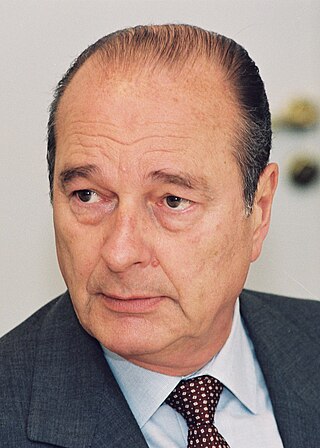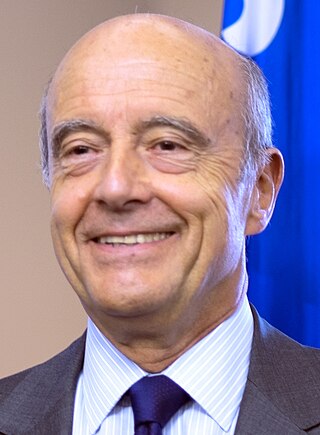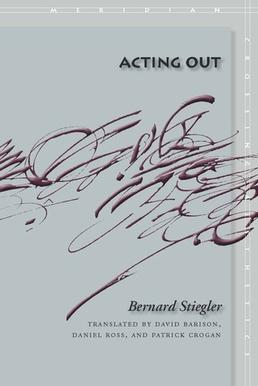
Jacques René Chirac was a French politician who served as President of France from 1995 to 2007. He was previously Prime Minister of France from 1974 to 1976 and 1986 to 1988, as well as Mayor of Paris from 1977 to 1995.

Lionel Robert Jospin is a French politician who served as Prime Minister of France from 1997 to 2002.

Presidential elections were held in France on 21 April 2002, with a runoff election between the top two candidates, incumbent Jacques Chirac of the Rally for the Republic and Jean-Marie Le Pen of the National Front, on 5 May. This presidential contest attracted a greater than usual amount of international attention because of far-right candidate Le Pen's unexpected appearance in the runoff election.

Alain Marie Juppé is a French politician. A member of The Republicans, he was Prime Minister of France from 1995 to 1997 under President Jacques Chirac, during which period he faced major strikes that paralysed the country and became very unpopular. He left office after the victory of the left in the snap 1997 legislative elections. He had previously served as Minister of Foreign Affairs from 1993 to 1995, and as Minister of the Budget and Spokesman for the Government from 1986 to 1988. He was president of the political party Union for a Popular Movement (UMP) from 2002 to 2004 and mayor of Bordeaux from 2006 to 2019.

Édouard Balladur is a French politician who served as Prime Minister of France under François Mitterrand from 29 March 1993 to 17 May 1995. He unsuccessfully ran for president in the 1995 French presidential election, coming in third place.

Presidential elections were held in France on 23 April, with a second round on 7 May.
Cohabitation is a system of divided government that occurs in semi-presidential systems, such as France, whenever the president is from a different political party than the majority of the members of parliament. It occurs because such a system forces the president to name a premier who will be acceptable to the majority party within parliament. Thus, cohabitation occurs because of the duality of the executive: an independently elected president and a prime minister who must be acceptable both to the president and to the legislature.
In the 1980s and 1990s there were, in the Paris region (Île-de-France), multiple instances of alleged and proved political corruption cases, as well as cases of abuse of public money and resources. Almost all involved were members of the conservative Rally for the Republic (RPR) ruling party, which became the Union for a Popular Movement (UMP) in 2002.

Legislative elections were held in France on 9 and 16 June 2002, to elect the 12th National Assembly of the Fifth Republic, in a context of political crisis.

Legislative elections were held in France on 25 May and 1 June 1997 to elect the 11th National Assembly of the French Fifth Republic. It was the consequence of President Jacques Chirac's decision to call the legislative election one year before the deadline.

Legislative elections were held in France on 21 and 28 March 1993, to elect the tenth National Assembly of the Fifth Republic.
The Gauche Plurielle was a left-wing coalition in France, composed of the Socialist Party, the French Communist Party, the Greens, the Left Radical Party, and the Citizens' Movement. Succeeding Alain Juppé's conservative government, the Plural Left governed France from 1997 to 2002. It was another case of cohabitation between rival parties at the head of the state and of the government. Following the failure of the left in the 2002 legislative election, it was replaced by another conservative government, this time headed by Jean-Pierre Raffarin.

At age 69, Jacques Chirac faced his fourth campaign for the French Presidency in 2002. He was the first choice of fewer than one voter in five in the first round of voting of the presidential elections of April 2002. It had been expected that he would face incumbent prime minister Lionel Jospin on the second round of elections; instead, Chirac faced controversial far right politician Jean-Marie Le Pen of the law-and-order, anti-immigrant National Front, and won re-election by a landslide; most parties outside the National Front had called for opposing Le Pen, even if it meant voting for Chirac. Slogans such as "vote for the crook, not for the fascist" or "vote with a clothespin on your nose" appeared.
"We must reject extremism in the name of the honour of France, in the name of the unity of our own nation," Chirac said before the presidential election. "I call on all French to massively vote for republican ideals against the extreme right."

The Zug massacre took place on 27 September 2001 in the city of Zug in the canton's parliament. Friedrich Leibacher shot dead 14 people before killing himself. Leibacher was armed with a civilian version of a Stgw 90, a SIG Sauer pistol, a pump-action shotgun, and a revolver, and wore a homemade police vest.
Events from the year 2002 in France.

Alain Richard is a French politician who served as Minister of Defence from 1997 to 2002. A former member of the Socialist Party (PS), he joined La République En Marche! in 2017.

Sylviane Agacinski-Jospin is a French philosopher, feminist, author, professor at the École des hautes études en sciences sociales (EHESS), and wife of Lionel Jospin, former Prime Minister of France. Her theoretical articulation of parity inspired the French law which requires every political party to fill 50 percent of all candidacies in every seat with women.

Christian Dornier is a French mass murderer who murdered his sister and mother and wounded his father with a 12-gauge double-barrelled shotgun at their farm on July 12, 1989. He then drove through the village of Luxiol and the adjacent area, shooting people at random. A total of fourteen people were killed and eight others injured in Dornier's half-hour rampage, before police managed to subdue him.

Acting Out is a book by French philosopher Bernard Stiegler. It is composed of two short works, "How I Became a Philosopher", and "To Love, To Love Me, To Love Us: From September 11 to April 21", which were published separately in French in 2003 as Passer à l'acte and Aimer, s'aimer, nous aimer: Du 11 septembre au 21 avril. Acting Out was published by Stanford University Press in 2009, and the translators were David Barison, Daniel Ross, and Patrick Crogan.
There have been eleven presidential elections in France since the establishment of the Fifth Republic in 1958.















